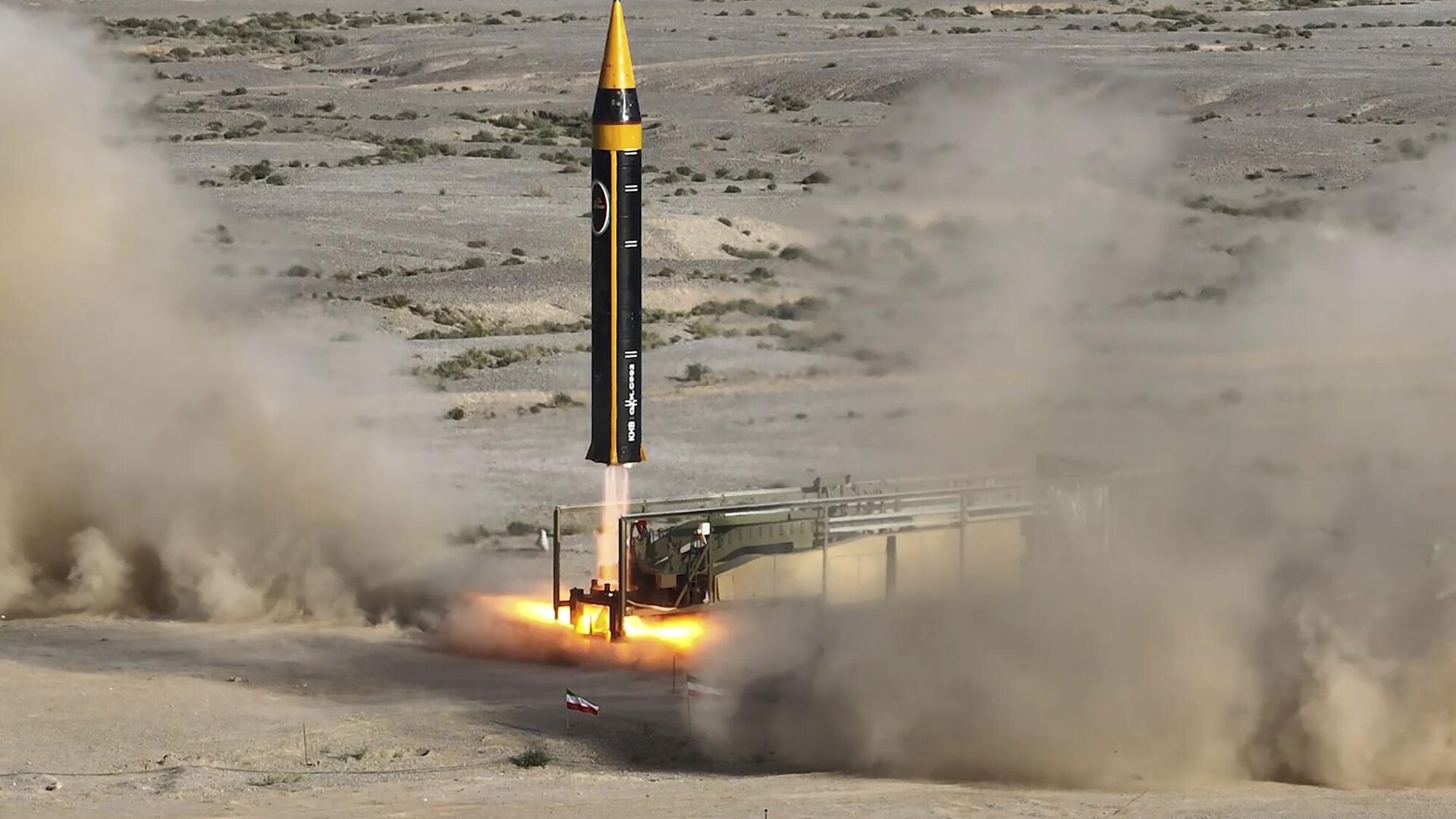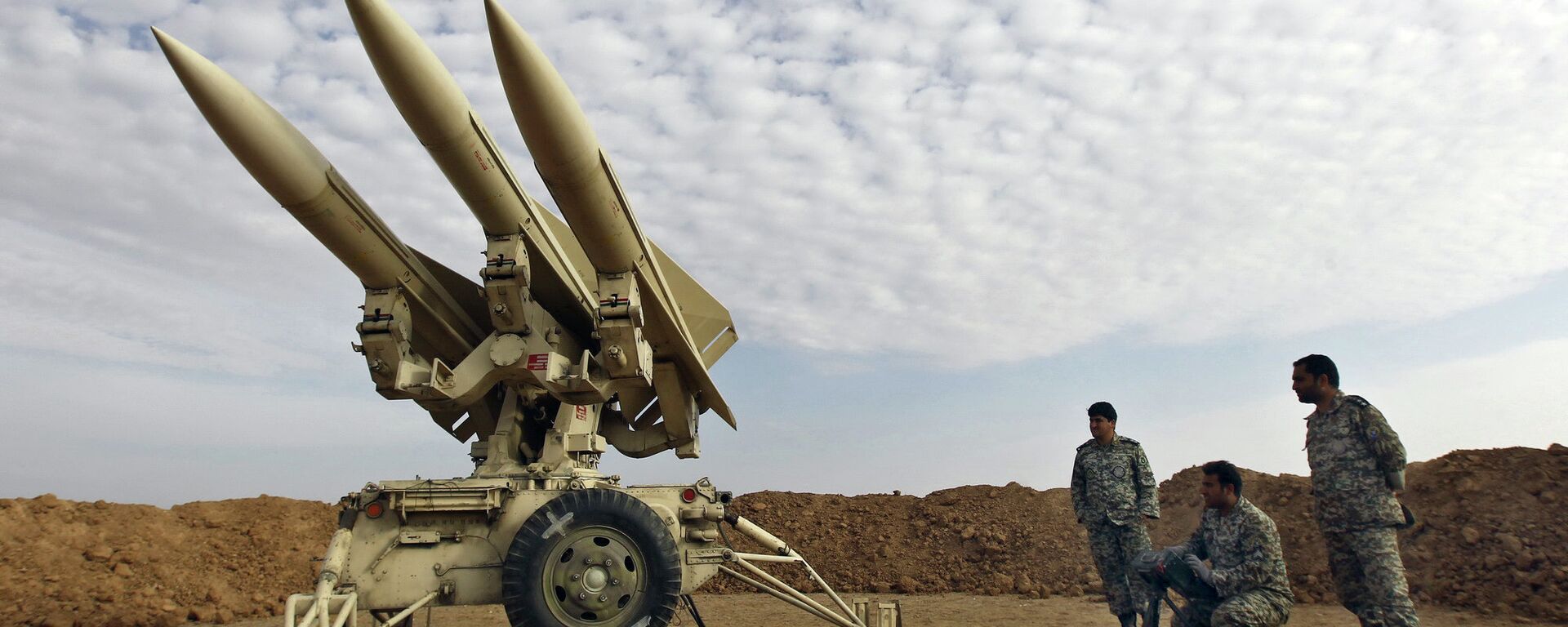https://sputniknews.in/20250331/what-are-the-prospects-of-war-between-the-us-and-iran-8929178.html
Should We Brace for Large-Scale Iran-US War?
Should We Brace for Large-Scale Iran-US War?
Sputnik India
After Trump's warning of military action, Iran's Supreme Leader Khamenei threatened a powerful response, escalating fears of a potential confrontation between... 31.03.2025, Sputnik India
2025-03-31T21:06+0530
2025-03-31T21:06+0530
2025-03-31T21:16+0530
sputnik opinion
donald trump
s. jaishankar
iran
us
tehran
washington d.c.
nuclear weapons
nuclear disarmament
international atomic energy agency (iaea)
https://cdn1.img.sputniknews.in/img/07e9/03/05/8835998_0:104:2000:1229_1920x0_80_0_0_60fbf580f37ad07f8ce3ac7e2fd39ddf.jpg
At present, the trajectory between the United States and Iran appears to be moving toward conflict rather than a constructive diplomatic resolution, an expert has said.The prognosis of a direct confrontation between Iran and the US is largely fueled from President Donald Trump's administration raising the stakes by intensifying tensions via reinstating maximum pressure sanctions within his initial weeks in presidency, Anant Mishra, a Marie Curie Research Fellow at the International Centre for Policing and Security (ICPS), University of South Wales, told Sputnik India.Israel's influence is all the more visible in this, with its Prime Minister Benjamin Netanyahu even urging the administration to endorse direct military action against Iran's nuclear facilities, according to one estimate, resulting in a heightened risk of a major military confrontation, he added.Perhaps the most dangerous fallout of all: the strike could backfire and accelerate exactly what Trump aims to prevent — Iran building a nuclear weapon, he noted.Tehran is already enriching uranium close to weapons-grade levels. If it decides to withdraw from the Nuclear Non-Proliferation Treaty (NPT), the last mechanisms of international oversight would collapse. Worse, a military attack could empower Iran's hardliners and give them both the justification and momentum to pursue a nuclear bomb in earnest, Mishra pointed out.A conflict with Iran would result in serious economic fallout, from surging oil prices to heightened instability throughout the Middle East. In an already fragile political space in the region, any escalation would prove disastrous, the analyst highlighted.Iran has responded to the US in the same way it is treated: pressure with pressure, and genuine concessions with genuine concessions, Mishra explained.Tracing Iranian history, it’s clear that harshness rarely yields results, while concessions have often been reciprocated. Washington needs a strategy based on mutual respect, confidence-building, and verifiable progress, focusing on diplomacy with calibrated actions and sustained dialogue, the geopolitical specialist stated.The US could at best, release Iranian frozen assets for humanitarian use, or potentially could offer tangible benefits without lifting core US sanctions. These gestures, if sought for Tehran to reduce enriched uranium stockpiles or grant the International Atomic Energy Agency (IAEA) access, have the potential to open more doors, if sustained, he explained.Tracing Iran-US trajectory, any pressure without a diplomatic dialogue or even a slight possible incentive could potentially push Iran further toward the bomb and potentially drag not just the US but the entire world into a conflict, he opined.Nonetheless, India's response would be guided by a firm commitment to regional stability. First and foremost, India will call for restraint and immediate de-escalation on all sides. Diplomatically, it may engage both US and Iran, Israel possibly over sustained dialogues—as it has done in the past—urging dialogue over conflict, the researcher observed.In terms of strategic priorities, India's immediate plan of action could involve energy security, prohibiting any disruption in oil supplies or spikes in global prices directly impacting domestic prices and to a large extent, its economy.At a broader strategic level, India could potentially engage in a series of talks with the US while preserving its long-standing partnership with Iran, focusing on de-escalation even if it means opening doors to regional partners in the Middle East, hoping to invoke regional dialogue at the behest of putting an end to escalation, he concluded.
https://sputniknews.in/20250331/irans-missiles-primed-for-launch-in-case-of-escalation-by-united-states-reports-8926900.html
iran
us
tehran
washington d.c.
middle east
israel
Sputnik India
feedback.hindi@sputniknews.com
+74956456601
MIA „Rossiya Segodnya“
2025
Pawan Atri
https://cdn1.img.sputniknews.in/img/07e6/0c/13/139630_147:0:831:684_100x100_80_0_0_8fa2b25903e7787fe6a2698552c167df.png
Pawan Atri
https://cdn1.img.sputniknews.in/img/07e6/0c/13/139630_147:0:831:684_100x100_80_0_0_8fa2b25903e7787fe6a2698552c167df.png
News
en_IN
Sputnik India
feedback.hindi@sputniknews.com
+74956456601
MIA „Rossiya Segodnya“
Sputnik India
feedback.hindi@sputniknews.com
+74956456601
MIA „Rossiya Segodnya“
Pawan Atri
https://cdn1.img.sputniknews.in/img/07e6/0c/13/139630_147:0:831:684_100x100_80_0_0_8fa2b25903e7787fe6a2698552c167df.png
donald trump, s. jaishankar, iran, us, tehran, washington d.c., nuclear weapons, nuclear disarmament, international atomic energy agency (iaea), middle east, israel, benjamin netanyahu
donald trump, s. jaishankar, iran, us, tehran, washington d.c., nuclear weapons, nuclear disarmament, international atomic energy agency (iaea), middle east, israel, benjamin netanyahu
Should We Brace for Large-Scale Iran-US War?
21:06 31.03.2025 (Updated: 21:16 31.03.2025) After Trump's warning of military action, Iran's Supreme Leader Khamenei threatened a powerful response, escalating fears of a potential confrontation between the US and Iran.
At present, the trajectory between the United States and Iran appears to be moving toward conflict rather than a constructive diplomatic resolution, an expert has said.
The prognosis of a direct confrontation between Iran and the US is largely fueled from President Donald Trump's administration raising the stakes by intensifying tensions via reinstating maximum pressure sanctions within his initial weeks in presidency, Anant Mishra, a Marie Curie Research Fellow at the International Centre for Policing and Security (ICPS), University of South Wales, told Sputnik India.
Israel's influence is all the more visible in this, with its Prime Minister
Benjamin Netanyahu even urging the administration to endorse direct military action against Iran's nuclear facilities, according to one estimate, resulting in a heightened risk of a
major military confrontation, he added.
"However, a war with Iran wouldn't just risk entangling the US in yet another protracted conflict—it could also derail President Trump's broader domestic and international agenda. A unilateral strike could also fracture international unity. Even though Russia and China are wary of Iran's nuclear ambitions, they would likely condemn the US for initiating hostilities, framing it as reckless aggression," the strategic affairs pundit stressed.
Perhaps the most dangerous fallout of all: the strike could backfire and accelerate exactly what Trump aims to prevent — Iran building a nuclear weapon, he noted.
Tehran is already enriching uranium close to weapons-grade levels. If it decides to withdraw from the Nuclear Non-Proliferation Treaty (NPT), the last mechanisms of international oversight would collapse. Worse, a military attack could empower Iran's hardliners and give them both the justification and momentum to pursue a nuclear bomb in earnest, Mishra pointed out.
A conflict with Iran would result in serious economic fallout, from surging oil prices to heightened instability throughout the Middle East. In an already fragile political space in the region,
any escalation would prove disastrous, the analyst highlighted.
"The US seriously needs a pragmatic Iran-centric approach to de-escalation—offering Iran possible incentives in exchange for verifiable limits on its nuclear program, without honing in on dismantling the entire program," Mishra underlined.
Iran has responded to the US in the same way it is treated: pressure with pressure, and genuine concessions with genuine concessions, Mishra explained.
Tracing Iranian history, it’s clear that harshness rarely yields results, while concessions have often been reciprocated. Washington needs a strategy based on mutual respect, confidence-building, and verifiable progress, focusing on diplomacy with
calibrated actions and sustained dialogue, the geopolitical specialist stated.
The US could at best, release Iranian frozen assets for humanitarian use, or potentially could offer tangible benefits without lifting core US sanctions. These gestures, if sought for Tehran to reduce enriched uranium stockpiles or grant the International Atomic Energy Agency (IAEA) access, have the potential to open more doors, if sustained, he explained.
"In such heightened tension, the US could at best call for a strategic pause, refrain from putting any more sanctions or escalatory measures, in return for Iran to suspend any progress on the enrichment side, potentially bringing them to the discussion table. This step could at best sustain dialogue and prove to be a progressive step in potentially de-escalating tensions, exploring more negotiations by both, creating a stage for comprehensive dialogue between the two parties," Mishra underscored.
Tracing Iran-US trajectory, any pressure without a diplomatic dialogue or even a slight possible incentive could potentially push Iran further toward the bomb and potentially drag not just the US but the entire world into a conflict, he opined.
Nonetheless, India's response would be guided by a firm commitment to regional stability. First and foremost, India will call for restraint and immediate de-escalation on all sides. Diplomatically, it may engage both US and Iran, Israel possibly over sustained dialogues—as it has done in the past—
urging dialogue over conflict, the researcher observed.
"People have already seen that playbook in action: during previous spikes in tensions, EAM [S Jaishankar] had reached out to key regional players, including Iran, the US, and Gulf states, to lower the temperature. At the same time, India could swiftly move to ensure the safety of its nationals, possibly evacuating if push does come to shove and other nationalities as part of the humanitarian corridor," Mishra emphasised.
In terms of strategic priorities, India's immediate plan of action could involve energy security, prohibiting any disruption in oil supplies or spikes in global prices directly impacting domestic prices and to a large extent, its economy.
At a broader strategic level, India could potentially engage in a series of talks with the US while preserving its long-standing partnership with Iran, focusing on de-escalation even if it means opening doors to regional partners in the Middle East, hoping to invoke regional dialogue at the behest of putting an end to escalation, he concluded.



